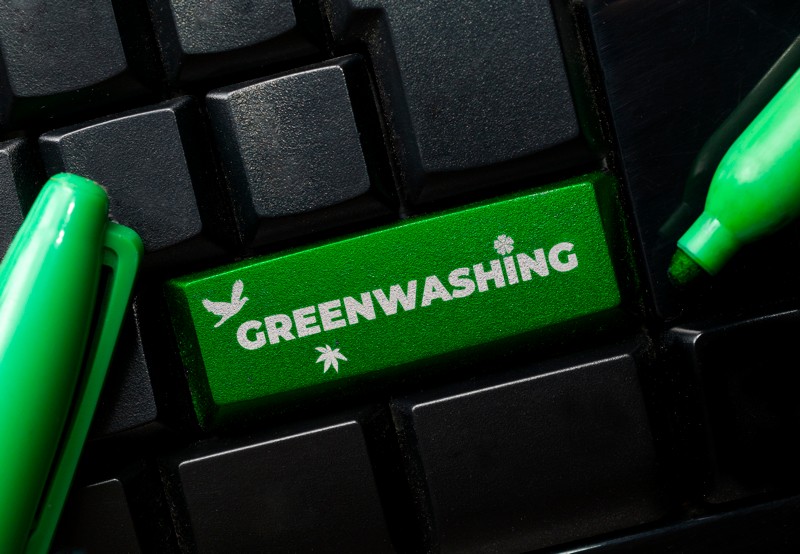Last month, Starbucks, a famous franchise café brand, was at the center of controversy for giving away limited use, reusable cups, as part of their eco-friendly marketing campaign. Many people questioned the value of offering reusable cups with a limited lifespan, as a solution for protecting our environment. These kinds of controversies are not limited to Starbucks. As more people become interested in environmental issues, many businesses are using eco-friendly as a buzzword for product and marketing advantages, but in some cases we have to wonder, are they really accomplishing what they promise?
Greenwashing is the process of conveying a false impression or providing misleading information about how a company's products are environmentally sound. Maintaining their eco-friendly images, companies deceive their customers into thinking their products are green and, in the process, earn profits. Businesses are scrambling to market eco-friendly promotions. Even the financial sector is getting in on the game by marketing green bonds. However, unlike the originally intended purpose of eco-friendly promotions, in some cases it is clear, these actions offer greatly exaggerated effects.
Currently, many franchise cafes are launching seasonal tumblers or holding events with reusable cups. This kind of eco-friendly marketing emphasizes they can be reused unlike traditional plastic disposable cups. However, many people have pointed out that seasonal products and the practice of offering limited quantities of some goods only increases consumption by encouraging consumers to buy them, which is not helpful for protecting the environment. For example, Starbucks which has pledge to stop using disposable cups altogether by 2025, is currently holding an event to provide reusable cups to consumers as part of their green marketing campaign. They held a ‘reusable cup day’ on the 28th of last month, attracting many consumers at locations across the country. Most customers had to purchase several coffees to qualify for the limited-edition cups. The campaign was criticized for tarnishing the meaning of environmentally friendly, by offering excessive amounts of plastic goods. The reusable cup made by Starbucks has a lifespan of 20 uses, while the company marketed it as something you can use “as much as possible."
 |
| ▲ Starbucks was at the center of controversy for their reusable products. (photo from Ohmynews) |
Another example of greenwashing comes from the American company Vital Farm. They are known for animal welfare and eco-friendly eggs. The company gained huge popularity for selling eggs produced by free-range chickens. However, on May 20, consumers filed a class action suit, claiming that Vital Farm was no different from a factory-type poultry farm except that it fed chickens on grass. They were criticized for slaughtered roosters, which do not lay eggs, and cutting the beaks of their birds to prevent them from pecking each other. Consumers said that they deceived customers and investors by promoting themselves as a company that produces eco-friendly eggs. Just as in these two cases, many big companies often misuse green marketing strategies and try to cheat consumers who want to act in an environmentally sustainable manner.
Some consumers might ask whether reusable containers are truly helpful for the environment. And if so, why are some franchise promotions being criticized for selling ‘reusable’ items? Last July, a public delivery application in Gyeonggi-do ‘Baedalteukgeub (Special delivery)’ started offering a reusable container delivery service, in collaboration with Ministry of Environment, Hwasung-si, Korea Foodservice Industry Association (KFA), and Green Korea. The purpose was to reduce the use of plastic and disposable containers to protect the environment. YouTube channel ‘Zeroway’ and the nonprofit organization ‘Institute for Climate Change Action (ICCA)’ conducted an experiment to learn more about the specific advantages of reusable products. ‘Zeroway’ and ICCA compared the carbon footprints of disposable and reusable containers. They examined the weight and material of the container, as well as the materials’ carbon emission factor, including water usage and the discarding process that also releases carbons. At first, the results were surprising. Emissions for disposable containers used once was 49gCO2e. The amount for reusable containers used once was 314gCO2e, which is larger than the level of emissions for their disposable counterparts. However, when the number of uses increases, the result changed. If those containers are used for a week, the level of emissions are similar. If they are used for about six months, disposable containers cause 8809gCO2e worth of emissions while reusable ones cause only 415gCO2e emissions, proving the long-term benefits of multi-use packaging.
 |
| ▲ Many companies misuse green marketing strategies and try to deceive consumers. (photo from Luxembourg times) |
This tells us the key is the number of uses. When we use disposable containers, we are significantly impacting carbon emissions. On the other hand, reusable containers need only water resources for sanitation after each use, so they lessen greenhouse gases in the long term. CIRAIG, an environment protection group in Canada, reported that using a plastic tumbler more than fifty times or a stainless-steel tumbler two hundred and twenty times, can have a meaningful impact on the environment.
Therefore, it is highly unlikely that a coffee cup with a recommended use of 20 times will help reduce carbon footprint emissions. Consumers have been deceived by the greenwashing, which persuaded them to consume more and adversely affect the environment. Since greenwashing is not an academically proven concept, there is no globally accepted criterion for judgment. But in foreign countries, several efforts have been made to reveal cases of greenwashing and establish a criterion for truly eco-friendly policies.
The European Union (EU) is obligated to implement the ‘Non-Financial Information Disclosure Guidelines (NFRD)’ to secure non-financial management information associated with a corporation’s sustainability. There are plans to further strengthen the guidelines under the ‘Corporate Sustainability Report Guidelines (CSRD)’. Starting in 2023, the ‘Sustainable Financial Disclosure Regulation (SFDR)’ will take effect and financial companies will be obligated to disclose anti-sustainability factors that occur during asset management. This regulation stipulates companies must evaluate sustainability risks in their investment decision process, explain their ESG approach and report whether they considered major negative effects (Principle Adverse Impact, PAI) related to sustainability factors in their asset management process. In addition, companies in the EU will be obligated to apply Green Taxonomy, a green classification system created in 2021.
The UK pledged to investigate advertisements containing environmental messages and transportation industries through its Advertising Standards Commission (ASA) and examine the operations of companies to ensure they properly fulfill their carbon neutrality (zero real carbon emissions) commitments. In addition, the UK has mandated TCFD, a climate-related financial information disclosure task force, to operate throughout the UK economy in 2025. Korea has also announced a plan to make the disclosure of environmental and social information mandatory for all companies listed in KOSPI by 2030. However, the speed and level of information disclosure are considerably more conservative and insufficient as compared to the other countries.
Greenwashing marketing brings extra profits to companies in the short term. But if they want to save our planet and earn the real trust of consumers, they must think of real strategies that are truly eco-friendly. Corporations must change, but so do consumers. It is our responsibility to seek out companies we can trust and confirm their eco-friendly activities. For instance, Nike is actively recycling their manufacturing byproducts and utilizing reusable plastic raw materials. All the while, Nike doesn’t emphasis their recycling policies on their promotions or advertisements. Korean cosmetic company, Aromatica, is also setting a good corporate example by collecting their empty containers to recycle and reuse them.
Greenwashing confuses people, lowering consumer trust in the word eco-friendly, further contributing to environmental pollution. Companies should commit to sustainable development by disclosing information more transparently, so that greenwashing no longer adversely affects the future of the planet.
김주예, 구시현, 손수빈, 이소연 dankookherald@gmail.com

![[Campus Magnifier] Let's Surf the Library!](/news/photo/202404/12496_1765_4143.jpg) [Campus Magnifier] Let's Surf the Library!
[Campus Magnifier] Let's Surf the Library!
![[Campus Magnifier] Let's Surf the Library!](/news/thumbnail/202404/12496_1765_4143_v150.jpg)





